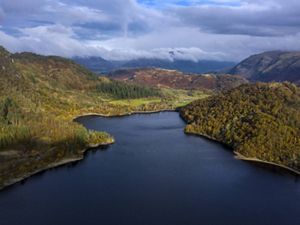Europe Can Lead the Way
Europe plays an outsized role in the global environmental landscape and can lead by example to tackle the climate crisis.
Europe has a long history of dealing with the large-scale interface between people and nature. In the 18th century, Europe led the world into a period of great technological innovation—the industrial revolution. However, global industrialization brought its consequences—the use of fossil fuels at scale resulted in an unprecedented rise in global greenhouse gas emissions. Centuries later, Europe has the opportunity to be at the forefront of great change once again, this time leading the world into the next, more sustainable phase of history, as a 21st century environmental leader that influences the world.
Maximizing the potential of Europe is vital to achieving our global planetary goals. Europe is home to respected, powerful institutions with global influence on policy, finance, and science, and plays an outsized role on a global conservation agenda around sustainable development, biodiversity and climate policy. European businesses lead on progressive environmental issues, and leading multinational corporations based in Europe are playing instrumental roles in sustainable development via their global footprint. Major industry platforms such as the World Economic Forum and the World Business Council for Sustainable Development (WBCSD) are based in Europe. European citizens have voiced strong demands on biodiversity and climate, and their strong public will and behavior influences governments, corporations, and citizens as a force of positive change around the world.

Setting the Path towards a Greener Future
To date, the European Union (EU) has already accomplished some impressive feats, setting precedent for other governments. Containing 27 countries and accounting for 15.6 per cent of the world’s global imports and exports, the EU is in a unique position that allows it to have an outsized role in the global environmental landscape. The EU overachieved its 2020 target to reduce greenhouse gas emissions by 20 per cent below 1990 levels, and the work has not stopped there. EU leaders recognize that the world’s largest trading bloc must continue to push the envelope in order to achieve the goals aligned in the Paris Agreement. The European Council has therefore subsequently committed to the ambitious goal of becoming the first climate-neutral continent by 2050.
In 2019, the European Commission created the European Green Deal—a roadmap to achieve carbon neutrality by 2050 and make the EU’s economy sustainable. Reaching this target requires action from all sectors of the economy – and working towards this goal has already placed Europe at the forefront of ideas and research on sustainable development, climate change, and green finance innovation.
Climate Action Initiatives
Under the Green New Deal:
-
European Climate Law
Enshrine the 2050 climate-neutrality objective into EU law. Dig deeper.
-
European Climate Pact
Engage citizens and all parts of society in climate action. Dig deeper.
-
2030 Climate Target Plan
Further reduce net greenhouse gas emissions by at least 55% by 2030. Dig deeper.
“The European Green Deal is our new growth strategy — for a growth that gives back more than it takes. It shows how to transform our way of living and working, of producing and consuming so that we live healthier and make our businesses innovative… By showing the rest of the world how to be sustainable and competitive, we can convince other countries to move with us.”
-Ursula von der Leyen, European Commission President
European Union's New Biodiversity Strategy
Marianne Kleiberg comments on adoption of landmark EU strategy
Learn MoreIn 2019 the European Investment Bank (EIB) also launched an ambitious climate strategy, becoming the EU’s Climate Bank and setting a precedent for the broader banking sector.
Most recently, the EU announced its Biodiversity Strategy for 2030 – a plan to tackle the accelerating collapse of nature both within Europe and in those countries from which the region imports key commodities. It addresses a wide range of biodiversity topics such as: unsustainable use of land and sea, overexploitation of natural resources, pollution, and invasive alien species.
Speaking at the time, Marianne Kleiberg – Regional Managing Director for Europe at The Nature Conservancy – said:
"The EU’s stated commitment to making all investments biodiversity-friendly, which we assume applies to both domestic expenditures and overseas development aid, is particularly noteworthy. The world needs leadership on conservation, and we acknowledge the prominent role that the EU is playing.”
Our Opportunity
Europe’s position as a leader in the environmental space, and its status as the world’s largest common market trading bloc and largest integrated economy, makes it an opportunity to showcase best-practice that both has global influence – for example in its trade policies – or set the bar for other global economies to follow.
Maximizing this potential will be vital to achieving The Nature Conservancy’s vision for a world where people and nature thrive.
The Nature Conservancy in Europe
Learn about how we manage a portfolio of strategically important conservation work in Europe that contributes to our global conservation agenda and accelerates conservation impact across the globe.



